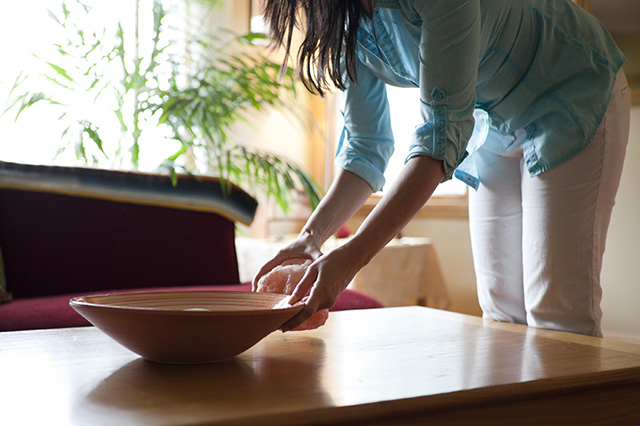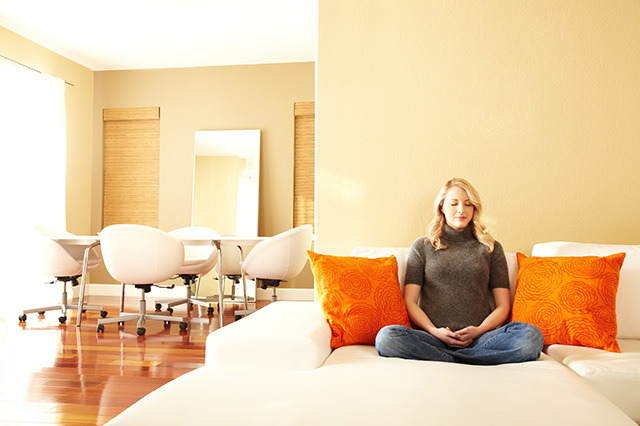Feng shui basics can be applied to nearly every room of the home, from living and dining to working spaces.
The ancient Chinese philosophy of feng shui (literally translated to “wind” and “water” – elements associated with health and good fortune) aims to balance the energy, or “chi,” of a space to benefit the lives of those inhabiting it.
Although thousands of years old, feng shui’s core principle of creating harmony through the thoughtful arrangement of items is still valued and used by modern architects and interior designers.
Whether or not you follow the various intricacies of feng shui rules, using your living space in a more efficient way can undoubtedly make you feel more comfortable and productive. Those who organize according to the practice often find it helps create a happier and healthier home.
To feel the benefits of feng shui, there’s no need to completely remodel so that certain things align (or don’t). Rather than breaking out a compass, trying to balance the elements or starting demolition, here are a few feng shui basics you can try in your home.
Doors and Entryways
Start at the place where people and energy enter your home: the front door. Doorways represent opportunities, so they should be well-maintained. Keep your front door clean, with no chipping paint or scuffs. Fixing squeaky hinges and making sure hardware such as the doorknobs, lock and doorbell are working properly improves feng shui and functionality.
Feng shui rules also emphasize the importance of the entryway; it’s the first thing you see when you come home, after all. Your entryway should be well lit and uncluttered. You don’t want to be tripping over things as you’re walking through the door. Too much clutter can make it difficult to think clearly.
Feng shui says that energy could be moving through your home too quickly if the front and back entrances are aligned. A simple fix would be placing a patterned rug at the doorway to help slow the energy. A nice warm rug also helps an entryway feel more inviting.
Let in the Sunshine
The ability to brighten your home with natural light is a sought-after trait — just listen to any one of the many home buying/selling shows on TV. Natural light is free, warm and uplifting. What’s more, not getting enough sunlight can sometimes affect your mood. To let in the most natural light, improve feng shui and your overall mood and health, make sure your windows are clean. Your home’s windows should also be dressed, preferably with soft and clean curtains or drapes.

Bedrooms
Feng shui rules for the bedroom can get a bit lengthy. Here are a few easy changes you can make to bring balance to your sleeping space.
- Your bedroom should feel comforting, like your personal oasis. When styling a bedroom, feng shui suggests cool/calm colors. Earth tones and other shades that occur in nature are all great options.
- To further encourage positive feelings, hang a piece of art you like across from your bed so that it’s one of the first things you see in the morning.
- Try to let natural light in during the day and make sure it’s dark at night. Darkness helps your body produce melatonin, a natural hormone that aids sleep, while sunlight will help you wake up.
- Finally – and this might be difficult for some – there should be no TV in the bedroom. A television disrupts the flow of energy in a bedroom and makes resting more difficult. “Its hard surface echoes light and noise,” says Open Spaces Feng Shui. “Its sharp corners reduce the soft feeling in the room.” Additionally, television can be distracting and too much artificial light right before bed can make it harder to fall asleep.
Kitchen
The kitchen is often called the heart of the home, and therefore, an important room for creating good feng shui.
Just like in the bedroom, go with natural colors in the kitchen. Yellow is said to be especially beneficial because it’s associated with good digestion.
Having live plants is another plus. Bringing greenery into the kitchen can be easily achieved in the form of fresh, home-grown herbs (which will help improve your cooking, too!)
Just like for the rest of your home, good lighting and a lack of clutter in the kitchen are some feng shui basics you should stick to. Layering the lighting with a mix of ceiling-mounted and hanging fixtures will help to balance the room’s light.
When it comes to cleaning and minimizing, kitchens can be tough because they often see a lot of traffic. Try not to overcrowd your countertops with kitchen gadgets and appliances. Using smart organization techniques can make it easier.
Trying to follow all the feng shui rules can be difficult; choose what works best for you to make your home an even more enjoyable place to be.
Have you tried feng shui in your home? Tell us about it in the comments.

















